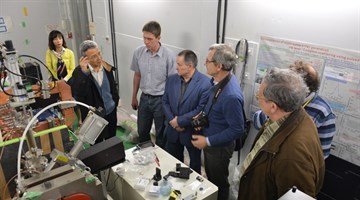TOMSK,
Feb 21 – RIA Tomsk. Scientists of Tomsk Polytechnic University (TPU) together with colleagues from Germany proposed a new method of
selecting metals for the sensors used in spectroscopy in various spheres – from
food industry to medicine; this way is more exact in comparison with existing,
the press service of the university reported on Wednesday.
It is specified that results of the corresponding research are published
in the Sensors and Actuators B magazine: Chemical. Scientists from Research
School of Chemistry & Applied Biomedical Sciences of TPU, Research School
of High-Energy Physics of TPU, Chemnitz University of Technology (Germany) and
University of Stuttgart (Germany) became authors of the work.
"Scientists offered a new method of comparison of metals which
helps to define what of them is suitable for creation of the sensors used in
the superficial strengthened Raman spectroscopy better with higher quality and
precisely, than all technologies existing today,", – it is said in the
statement.
It is specified that the Raman spectroscopy is applied to the molecular
analysis of drugs, the characteristic of qualities of materials, control of
mechanical tension in semiconductors. It helps to receive "passport"
of a molecule, which shows its chemical structure. This type of spectroscopy is
applied in the food industry, medicine, materials science and criminalistics.
© с сайта Томского политеха
"In simple terms, the molecule is lit with the laser, and
scientists identify it with a scattered light signal. Thus it also receives
unique "passport". The supersensitivity of the method is provided
with the special nanostructured metal substrates. Correctly picked up metal is
important for effective strengthening of optical signals", – the press
service reports.
In the scientific article scientists compared sensitivity to a light
signal of four metals – copper, aluminum, gold and silver. Before such
comparison, according to the authors, nobody conducted it. The authors found
out that copper and aluminum are comparable to the gold and silver which are
considered as the most sensitive metals.
"The sensitivity of such substrates is even higher, than at more
expensive commercial substrates. We managed to show that these materials are
perspective in the field of the Raman spectroscopy, so, it is possible to
reduce the price of this technology significantly", – professor of
Research School of Chemistry & Applied Biomedical Sciences of TPU Raul
Rodriguez commented the results of the research.